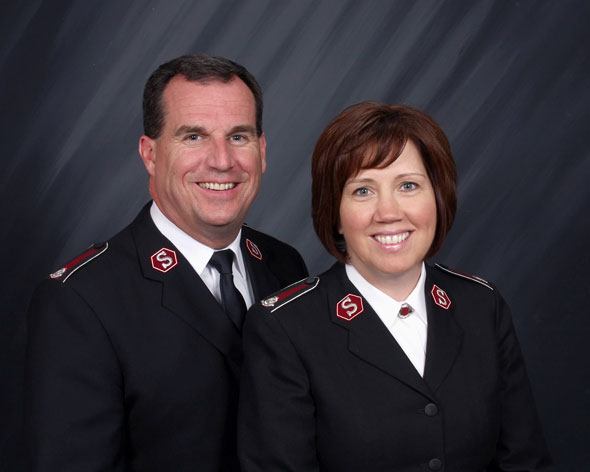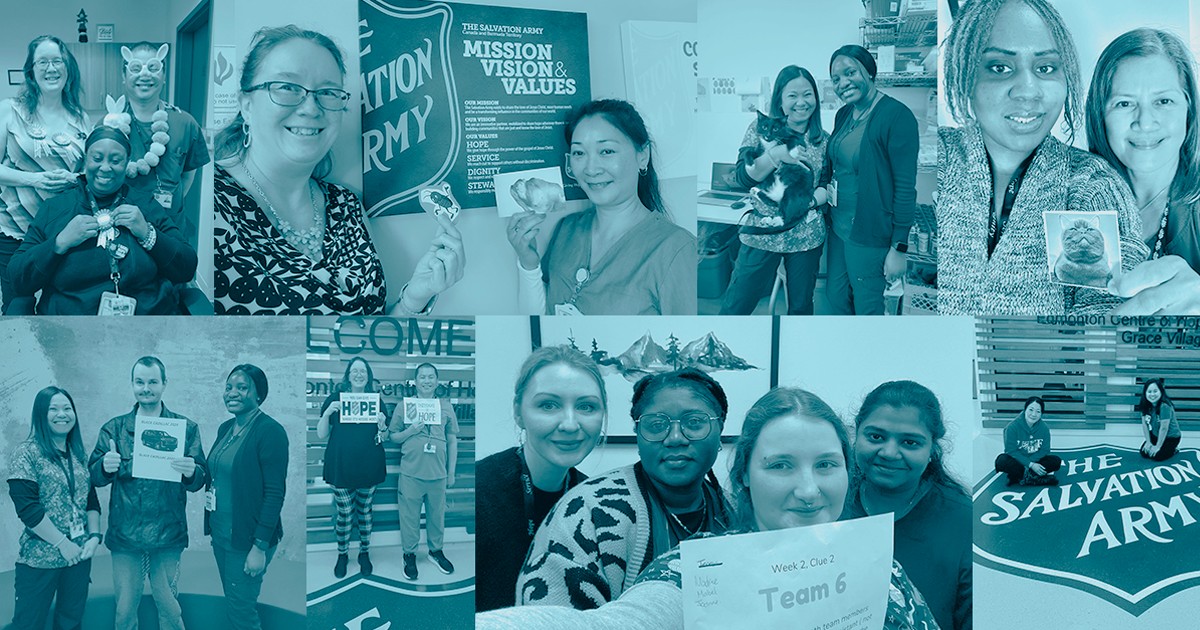 As he takes up his new appointment as chief secretary, Colonel Floyd Tidd speaks to John McAlister, senior editor, about his philosophy of ministry, the areas of concern that God has placed on his heart and the future of officership.
As he takes up his new appointment as chief secretary, Colonel Floyd Tidd speaks to John McAlister, senior editor, about his philosophy of ministry, the areas of concern that God has placed on his heart and the future of officership.
Explain the role of the chief secretary.
In a business context, it would be the chief operating officer, although I hesitate to use this term. The chief secretary is essentially the co-ordinator of operations for the Army. Divisional leaders and cabinet secretaries report to the chief secretary, who seeks to ensure that we are fulfilling our mission and the directives that come from International Heaquarters through the territorial commander as the General's representative.
That's what the role is organizationally, but I hope there is also an element of advocating, shaping and influencing—both upwards and downwards. I want to speak on behalf of ministry units and divisions, but also be able to help shape the direction in the field.
How do you see yourself fitting into this appointment?
Early in our officership, my wife, Tracey, and I wanted Philippians 1:3-5 to define our philosophy of ministry. In all our appointments, we've counted ourselves “privileged to be partners in the gospel.” This is the philosophy that I want to carry forward into this new appointment.
There are specific responsibilities that are, by organizational structure, those of the chief secretary, but I want to approach these within the context of partnership. That doesn't diminish the reality of some of the hierarchical elements that are in place, but it's important that I recognize and choose to work in relationship with others.
I try to maintain a strong conversational and consultative approach to ministry. We have tried to approach positions of leadership in a way that values the ideas and contributions of others. I believe that this strengthens the administrative process. While I understand and accept my responsibility to make the decisions that are the responsibility of my leadership role, I do not simply want to close my door and live this out in isolation.
What areas of concern has God laid on your heart?
One area that I feel is critical, and which seems to come up in every significant discussion, is the priority of discipleship. There is a real desire for authentic and effective discipleship at all levels of the organization, and it is the foundation for any other priority item or agenda. We need to discover together what it means today to be a solid follower of Christ in a Salvationist spirit. As we work that out, we'll also see the path forward for other priorities, such as our work with children and youth.
In recent decades we followed set programs to assist in discipleship. We had a predetermined pattern of what we wanted discipleship to look like. In our current culture, however, with so much change and diversity, a single model is no longer as effective. We need to work out discipleship in ways that provide solid content and life integration. We must get this piece right. Programs will be helpful as we maintain a focus upon celebrating “completing the person” and not simply “completing the program.”
Another area I'm passionate about is our work with children. This isn't limited to Sunday school or Pioneer Clubs, but rather finding ways to shape a different tomorrow with children. There are so many opportunities for us to reach out to children and families. With a stronger sense of integration among our existing ministries, and the freedom to explore new initiatives responding to local community needs, we can connect with families in new and exciting ways.
As an organization, I'd like to see a greater openness and willingness for us to champion and celebrate each other's ministries. Our territory is geographically large and quite diverse, so it's natural that we would have a wide variety of Salvation Army expressions. Rather than feel threatened or invalidated because people are doing things differently, we can recognize and value their obedience to God's call to respond to their local communities in a relevant manner.
Where do you see the Army's greatest growth potential?
The opportunities for partnerships in our communities are increasing. We are well-known and respected. I think this offers us the potential to engage people in conversation. There is a heightened openness to spirituality, so we have the chance to discuss issues of faith. What we do as an organization comes out of what we believe. And since our services offer a credibility for what we believe, there is a greater openness in people to understand our motivation. We are visible, so we have a voice. However, we do need to manage this carefully.
How can the Army reach out to the younger generation?
I wonder if what we think youth need from us is really what they're looking for. We must focus not so much what we can offer as far as programs, services or activities, but rather on presence and engaging in conversation. I know this sounds simplistic, but we need to learn to just sit with our young adults and listen to them. That listening must lead to a response, including action that engages and empowers a new generation. We must be prepared to go beyond the program, which offers content and learning through an intentional pattern. We must be prepared personally with good biblical knowledge, cultural sensitivity and a vibrant spiritual life to learn together in the natural and spontaneous teachable moments. That's the approach to discipleship that Jesus modeled.
Given that most Salvationists have developed within a programmed model of church, do we even know how to disciple people?
We have to be willing to stumble into conversations. Many of us struggle to find a natural vocabulary to converse about faith experiences and discipleship. Can we find a way to translate “How is it with your soul?” into today's culture and language? We can talk about work and sports, but we don't know how to ask people about what's going on in their hearts. How do we create conversations about spirituality? How do we ask people where they are in their spiritual journeys? Being more intentional about this will encourage mutual development in our discipleship journey.
How do you see the role of officership evolving?
It's different across the territory. Officership has always had elements that evolve. We're all trying to understand what that looks like and what it means for the Movement today. I think the evolution is necessary because the culture has changed. We're learning to work and live within this tension. We have to celebrate this process, but also encourage officers so that they become both facilitators and accountable leaders.
For example, today's corps officers no longer have people working for them as local officers and volunteers. Everyone is working together. However, the officer is still ultimately accountable for what happens in that congregation. As officers, we can't abdicate our spiritual authority and responsibility—it's scriptural—but we can't impose it in such a manner that prevents those in our congregation from being the “priesthood of all believers.” It's an evolving thing that officers are independently working through in their given contexts. Sometimes it comes easily and sometimes it takes us a little longer to learn. Similarly, an officer in a social services ministry unit today faces challenges very different from 20 years ago.
As officership evolves, we have to figure out what are the essential elements that cannot change. An officer's covenant provides that foundation. We need to find ways to engage officers and lay people in this; it needs to happen in co-operative conversation. We need to identify what is working well and what is missing the mark. Officers are still leading, but leading in partnership. They must embrace the corporate wisdom of the congregation, but not be absolved from accountability and making the decisions. In the end, I hope we maintain a sense of sacrificial living. The evolution cannot vary from what we have covenanted to do as officers.
What is the appeal of officership today?
The appeal is knowing that we are simply being obedient to what God has called us to. Obedience isn't popular today, but perhaps we need to view officership more as obedience to God lived out through an institution, rather than just obedience to an institution. It's the privilege of being called by God to partner with him in what he's doing in people's lives in significant ways. Officership is not a thing that I do, it's who I am. I am able, by virtue of my officership, to devote myself entirely to ministry. As an officer, I have the privilege to focus my entire day in helping others discover God's design and purpose on their lives and the world. However, with this privilege comes great accountability. To whom much is given, much is expected.
Colonels Floyd and Tracey Tidd
were both born and raised in Sudbury, Ont., and were active members in the local corps throughout their childhood years and into their teens. Colonel Floyd Tidd pursued post-secondary studies at the University of Western Ontario and Laurentian University, graduating with a Bachelor of Science degree. He also graduated from Tyndale Seminary with a Masters in Theological Studies and is a graduate of the Arrow Executive Leadership program.
The Tidds entered the Toronto College for Officer Training in 1984. Their first appointment was as associate officers at Mississauga Temple, Ont., with responsibility for planting a new corps in Meadowvale (now Cornerstone Community Church). They have also served as corps officers at Georgina Corps in Jackson's Point, Ont., before an appointment as divisional youth leaders for the former Ontario West Division. They returned to corps leadership at Woodroffe Temple in Ottawa. In 2001, they were appointed as territorial youth secretary and assistant territorial youth secretary.
In 2004, Colonel Floyd Tidd was appointed as the territorial corps ministries secretary and Colonel Tracey Tidd was appointed as the children's ministries secretary for the corps ministries department. In 2007, Colonel Tracey Tidd assumed responsibilities as chaplain at Broadview Village, which she continued with as an additional responsibility when they entered divisional leadership roles in 2008. Colonels Tidd have served as divisional commander and divisional director of women's ministries for the Ontario Central-East Division prior to their current appointments as chief secretary and territorial secretary for women's ministries.
Colonels Tidd have two children, Kaleena and Christopher.









I believe you have communicated to us a weakness that surely needs addressing.
The issue of natural communication, the moving from sports, fashion, world crisis, etc. to the world of 'heart', spirit, soul. I trust that there will be further comment, more reflection, and 'invented tools' that may be used by the average 'soldier of Christ' in their journey of life. I really do believe that this is crucial to the gospel being told in our post-modern world. Testimony has power, but it can only be heard as we learn the art of effective communication.
I am hoping to hear more on this vital area.
Blessings in your newfound position.